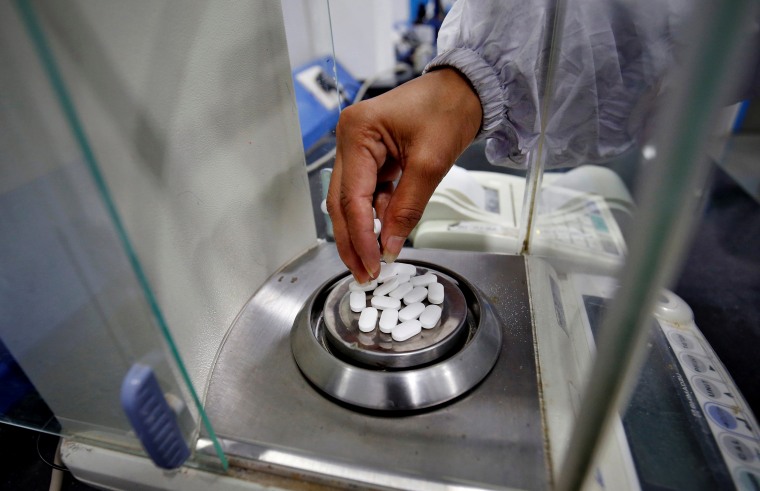WASHINGTON — Trump administration officials are asking India to lift restrictions to give the U.S. access to pharmaceutical ingredients to produce a range of drugs amid fears of a U.S. drug supply shortage prompted by the coronavirus outbreak, three sources familiar with the matter told NBC News.
The two governments are holding discussions aimed at easing new restrictions on pharmaceutical exports from India, which New Delhi introduced to ensure that the country would have medicine needed to handle the pandemic inside its borders, the sources said.
With the coronavirus potentially disrupting the global supply chain for medicine, India earlier this month restricted the export of 26 pharmaceutical ingredients and the medicines made from them, including acetaminophen — a common pain reliever. India, the world's leading supplier of generic drugs, is a key source for active pharmaceutical ingredients used to produce a range of medicines.
Full coverage of the coronavirus outbreak
Apart from legal constraints on exports, India is on a 21-day lockdown to prevent the spread of COVID-19, which has hampered production and shipping of pharmaceuticals and other cargo. As a result, Trump administration officials also are trying to hammer out what drugs are available in Indian companies' stockpiles, said a congressional aide who was briefed on the discussions.
"What do they have available for purchase? This is something the administration is trying to work through with the Indians," said the aide, who was not authorized to speak on the record.
Asked about the U.S. request, a State Department spokesperson said, "We are collaborating to try to ensure that critical manufacturing and supply chains for pharmaceuticals, health care technology and personal protective equipment remain open even as large portions of our countries are shut down to reduce the risk of transmission."
India's embassy in Washington did not respond to a request for comment. In a tweet last week, India’s ambassador to the U.S., Taranjit Singh Sandhu, cited cooperative ties between U.S. and India in the medical field and praised efforts in India to help “U.S. companies in their efforts to fight Covid19,” but he did not address questions about drug exports to the American market.
Health industry analysts say limits on exports from India could cause shortages of vital drugs in the U.S. as hospitals brace for an influx of coronavirus patients. American health workers say they are particularly concerned about a possible shortage of anti-malarial drugs, albuterol or inhalers, and sedatives like fentanyl used for patients on ventilators.
Download the NBC News app for full coverage and alerts about the coronavirus outbreak
Since the 1990s, U.S. companies have increasingly relied on imports of pharmaceutical products from India and China because of cheaper manufacturing costs and less stringent regulations.
The coronavirus forced some Chinese drug factories to close, but production has since resumed. The closures affected India's generic drug industry, which relies heavily on raw ingredients from China for antibiotics and other medicine.
The chief executive of the Swiss pharmaceutical giant Novartis, Vas Narasimhan, told CNBC on Friday that his company was monitoring the global supply network and had not seen major problems so far.
"We're tracking it very closely. We're well aware of the situation in India and China, as well as other parts of the world where we source a lot of our active pharmaceutical ingredients," Narasimhan said on CNBC's "Squawk Box Europe."
"But so far, we haven't seen significant disruptions. I am hopeful that countries around the world will maintain open borders, because our supply chains are very interconnected."
Indian drug producers appear well placed to meet demand both in India and in the U.S. market, said Anup Malani, a professor at the law school and school of medicine at the University of Chicago.
But quarantine requirements for cargo ship crews and health inspection measures taken by customs authorities around the world will slow drug shipments and raise transport costs, he said.
"I think the bottom line is going to be that we are going to see increases in the time required to ship products because of quarantines," Malani said.
India said Wednesday that it had banned the export of hydroxychloroquine and formulations of the anti-malaria drug, as well as exports of the active pharmaceutical ingredient in the drug. Researchers are examining whether the drug could help patients with COVID-19.
International demand has spiked for hydroxychloroquine and chloroquine, a similar drug that produces more side effects, after small-scale tests indicated that the drugs showed potential promise against COVID-19.
President Donald Trump also has promoted the anti-malarial drugs as a "game-changer," but so far there is no firm scientific evidence about the drugs' efficacy against the coronavirus. Larger-scale clinical trials are planned in New York and by the World Health Organization.
Narasimhan of Novartis said that if clinical tests ultimately show that hydroxychloroquine is effective, the company would make plans to produce it at multiple sites around the world.


